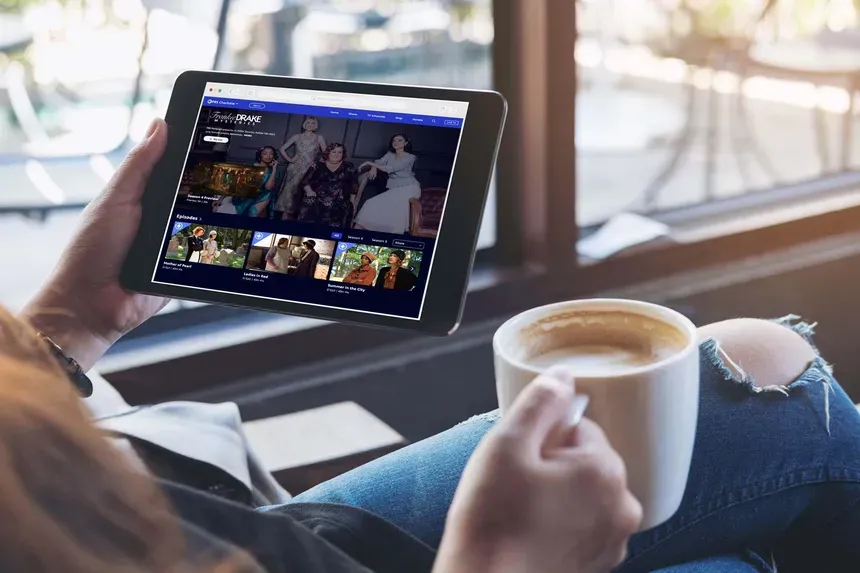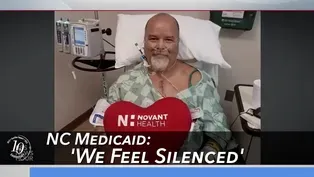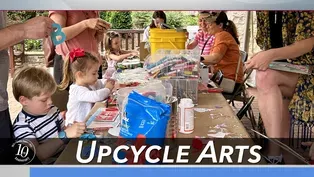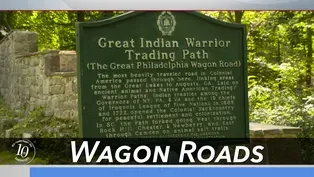
Carolina Impact: May 9, 2023
Season 10 Episode 24 | 26m 59sVideo has Closed Captions
PBS Clt and NewsHour on Medicaid, Carolina Farm Trust, Upcycle Arts, & the Great Wagon Rd.
In NC, more Medicaid. But not for everyone. Team coverage from PBS Charlotte and PBS NewsHour. Carolina Farm Trust works to help local farmers and keep local produce in the region. Discover the origins of roads in the Carolinas, & how Native American paths became roads. Charlotte's first creative reuse center, Upcycle Arts, is selling donated items and art supplies, giving them a second life.
Problems with Closed Captions? Closed Captioning Feedback
Problems with Closed Captions? Closed Captioning Feedback
Carolina Impact is a local public television program presented by PBS Charlotte

Carolina Impact: May 9, 2023
Season 10 Episode 24 | 26m 59sVideo has Closed Captions
In NC, more Medicaid. But not for everyone. Team coverage from PBS Charlotte and PBS NewsHour. Carolina Farm Trust works to help local farmers and keep local produce in the region. Discover the origins of roads in the Carolinas, & how Native American paths became roads. Charlotte's first creative reuse center, Upcycle Arts, is selling donated items and art supplies, giving them a second life.
Problems with Closed Captions? Closed Captioning Feedback
How to Watch Carolina Impact
Carolina Impact is available to stream on pbs.org and the free PBS App, available on iPhone, Apple TV, Android TV, Android smartphones, Amazon Fire TV, Amazon Fire Tablet, Roku, Samsung Smart TV, and Vizio.

Introducing PBS Charlotte Passport
Now you can stream more of your favorite PBS shows including Masterpiece, NOVA, Nature, Great British Baking Show and many more — online and in the PBS Video app.Providing Support for PBS.org
Learn Moreabout PBS online sponsorship- [Announcer] Support for Carolina Impact comes from our viewers and Wells Fargo.
- [Spokesperson] Wells Fargo has donated $390 million.
- Honey, like I said, you get your own room.
- [Spokesperson] To support housing affordability solutions across America.
(uplifting music) - Get it, get it.
- [Spokesperson] Doing gets it done.
Wells Fargo, the Bank of Doing.
(upbeat music) - [Announcer] This is a production of PBS, Charlotte.
- Just ahead on "Carolina Impact"."
(electronic music) - North Carolina expands Medicaid.
More insurance for those who don't have health insurance, I'm Jeff Sonier.
We'll tell you who's being helped and also who's not.
- Plus, we'll learn what's being done to eliminate food deserts in Mecklenburg County.
And we take you to Upcycle, a type of artist's Candy Land, "Carolina Impact" starts now.
- [Voiceover] "Carolina Impact".
Covering the issues, people and places that impact you.
This is "Carolina Impact".
- Good evening, thanks so much for joining us.
I'm Amy Burkett.
This week, PBS Charlotte teams up with PBS News Hour in Washington for a closeup look at North Carolina's expanding Medicaid coverage.
What's it mean for families and workers without health insurance now and how will the state's hospitals and health clinics be affected?
And what will more Medicaid cost taxpayers?
"Carolina Impact"'s Jeff Sonier and videographer Doug Stacker begin our team coverage at a health clinic in North Charlotte.
- Yeah, we're here with the Camino Health Center in University City.
It's a nonprofit clinic (gentle music) that treats both the uninsured and the underinsured.
Camino calling itself a place of hope and healing.
- Do I have an appointment?
- [Jeff] Offering low cost or no-cost healthcare appointments primarily to Charlotte's Latino and immigrant community.
- The people we serve come with a dream.
(interpreter speaking in Spanish) They come with amazing values.
(interpreter speaking in Spanish) And they end up being incredible contributors back to our society.
(interpreter speaking in Spanish) We're seeing whole families come with young children.
(interpreter speaking in Spanish) - [Jeff] Camino founder Rusty Price talks about his staff's trip to the US Mexican border.
Also seeing where so many of the families they treat here in Charlotte come from and where so many more are on the way.
- Exactly, this big wave is coming.
The first part is here.
(Sylvia speaking in Spanish) - They give me medical services they give me my vaccines.
(Sylvia speaking in Spanish) At low cost.
- [Jeff] Sylvia Bonos made her trip from Mexico to Charlotte 17 years ago.
She's her family's Abuela, a stay-at-home grandmother who takes care of her daughter's kids, Sylvia's granddaughters, while their mom and dad are working.
(Sylvia speaking in Spanish) - And the littlest, her name is Leah and she's six years old.
- Sylvia speaks with us through a Camino interpreter.
- [Jeff] You don't have insurance?
(interpreter speaking in Spanish) (Sylvia speaking in Spanish) - No, we don't have insurance.
- [Jeff] And you're not covered by Medicaid?
(interpreter speaking in Spanish) (Sylvia speaking in Spanish) - [Interpreter] Yes, it's super scary.
It's super, super scary.
And if we don't have insurance, what happens if you have to go to the hospital, then we'll have to end up paying so much at high costs.
- [Jeff] Meanwhile, PBS News Hour also caught up with Kenneth Small, a self-employed landscaper in Rowan County who credits his free clinic in Salisbury with helping him survive heart surgery both physically and financially.
- I've never paid out of pocket to come here or anything.
So they're filling a large gap between people that are making too much money to qualify for Medicaid and can't afford insurance.
And that's where I fall in.
(tense music) - We have 1.1 million uninsured folks in North Carolina.
What we hear is that Medicaid expansion will cover about half of that.
- North Carolina is now the 40th state to expand Medicaid under the Affordable Care Act.
- [Jeff] PBS News Hours National correspondent John Yang picks up our story at the state capitol.
- When North Carolina's Medicaid expansion is fully implemented, an estimated 600,000 people will gain access to health coverage.
- Hey man, what you doing?
- Like Evida Bass who works in childcare in Hillsboro and didn't qualify for Medicaid under the old rules.
- [John] You're an assistant director here?
- I am.
- Work full-time?
- I do.
- But no health insurance?
- No health insurance.
- Now are you constantly worried about what happens if I get sick?
What happens if I have an accident?
- It's very hard to keep yourself, you know, up there, but I do what I have to do so I don't have a doctor bill.
They can.
- [John] Last year, Bass who's 30, had emergency surgery that left her out of work for a month and stuck with more than $36,000 in debt, an expense Medicaid would've helped pay.
- One thing I've always lived by, "Better late than never."
You kind of just gotta roll with the punches.
Granted, I wish it would've came a little bit earlier.
- If Bass qualifies under Medicaid's new income requirements, as she believes she will.
She says she'll enroll as soon as possible.
And then how quickly are you gonna make that appointment for a checkup?
- Soon as they approve me.
(laughs) - [John] Last month, Governor Roy Cooper, a Democrat, signed a bill passed by the Republican-controlled legislature expanding Medicaid access in the state.
- We have a Medicaid expansion bill.
(group applauds) - When it's implemented, the program will be open to families and individuals whose incomes are lower than 138% of the federal poverty line.
That's about $20,000 for an individual.
Before expansion, most adults without children or a disability weren't eligible at all, no matter how low their income.
State Representative Donnie Lambeth is a former hospital executive.
Since 2017, he'd been trying to get his fellow Republicans, who controlled both legislative chambers all those years, to pass expansion.
So it was really an education process to get your fellow Republicans on your side?
- Exactly, and I think when you first talk about expansion, it's like, and this was what they said to me, "Oh no, we're expanding "another government entitlement program."
The neat thing about this program is, it doesn't cost the state any money.
- [John] In all, the expansion and a one-time federal bonus is expected to bring in 8 billion a year for the state's healthcare providers.
The state government's contribution to the cost of expanded coverage will come from hospitals, not taxpayers.
- [Jeff] Back here in Charlotte, Atrium Health, North Carolina's largest Medicaid provider, calls the expansion "A big step forward "for our entire state that will usher in "a healthier tomorrow for all."
But the smaller low-cost clinics like Camino worry about their poorest patients who still won't have health insurance, even after Medicaid expands.
- Unfortunately for the community that we serve, that doesn't offer any relief.
(interpreter speaking in Spanish) No, it does not cover them.
(interpreter speaking in Spanish) Absolutely, I think for us, the priority continues to be this community that is uninsured, that is underserved.
(interpreter speaking in Spanish) And that are under-prioritized.
- You know that North Carolina expanded Medicaid, but that doesn't help you does it?
(interpreter speaking in Spanish) (Sylvia speaking in Spanish) - Yes, I want help, not a handout.
- That's the saddest story.
When older folks who need healthcare, when young children who need healthcare, don't get the care they need.
(Sylvia speaking in Spanish) - Yes, we feel silenced.
We feel that frustrated, we feel there's nobody to help us elevate our voices.
(tense music) - Yeah, elevating those unheard voices are why Camino leaders were in Raleigh shortly after the governor signed that Medicaid expansion bill, they were thanking lawmakers for their help, but also reminding them that for now at least, they're not helping everybody who needs it.
Amy?
- Thank you, Jeff.
At PBScharlotte.org, you'll find more information about Medicaid expansion in North Carolina, including links to the two Charlotte area clinics featured in our story and the entire Medicaid bill passed by lawmakers and signed by the governor.
There's a good chance you've heard of the term food desert, but what exactly is it?
According to the US Department of Agriculture, a food desert is an area with a poverty rate of 20% or higher and where at least a third of the population lives more than a mile from a grocery store.
Almost 15% of Mecklenburg's population lives in food deserts.
This is a greater percentage than both the national average of 11% and the state average of 13%.
As "Carolina Impact"s Jason Terzis shows us, there is at least one organization doing what it can to change that.
(blues music) - We're just growing in here for seed production for next year.
- [Jason] Bernard Singleton gives us a tour of his pride and joy.
- All those are gonna be different cultivars of rice.
- [Jason] Nebudaye Farms in Union County.
- [Reporter] Now how much land do you have here?
How many acres you got?
- This is 11 acres total.
- [Jason] The unique name is rooted in history.
- It's the word that they use for the moringa plant in Senegal.
It's like the pigeon warrior that never die 'cause it has so much health properties.
It's total, complete nutrition.
They call it the miracle plant.
- And it's that never die spirit that drives Singleton, with his mascot Chocolate, the goat, nearby.
He's been planting and growing all sorts of things.
Here at Nebudaye for the last three plus years.
- We maintain a African botanical garden where we grow about 23 species of vegetables and I consider myself a cultural preservationist around agriculture and food.
- [Jason] Singleton's growing success at Nebudaye comes in part thanks to the Carolina Farm Trust which, through corporate and individual donations and grants, supports small community-based farmers like Singleton by helping them lease or purchase land, equipment and other supplies.
- We are really trying to build a decentralized, regional food system.
You know, how do we build a profitable, an economic model for our farming community to participate in?
And then how do we create convenient access to our community up and down the socioeconomic ladder?
- He presented it to me, saying, "Oh, we may have a farm coming available "if you'd be interested."
First I said no.
Then I said yes.
(laughs) Okay, and I'm glad I did.
(upbeat music) - [Jason] The Carolina Farm Trust's main goal is to strengthen the local food system from local production to consumption.
- We're trying to get people to understand the importance of production and consumption.
And what we mean by that is understanding where your food comes from, the importance of it.
- There's a long journey, you know, from where that food started to where it ends up on that table.
And what we're trying to do with our mission is shorten that up but also get the community to understand where they spend their money in our food system is so critical.
- [Jason] Zach Wyatt serves as executive director of the Carolina Farm Trust which formed in 2015.
- And then the four on the ground pillars we have is an urban farm network, a farm apprentice program, a food is health program, and then a distribution platform you know, to drive economic models that are profitable for our farming community and create those convenient access points to our consumers.
- In addition to helping area farmers with infrastructure, the CFT feels that access to healthy foods shouldn't depend on race or socioeconomic status or where someone lives.
- But slowly within on the west side, I've noticed that the opportunity in the, let's call the playing field wasn't level.
All the grocery stores left.
And then you had convenience stores that came.
And so I watched slowly the access to fresh produce disappear.
- [Jason] And that's why Carolina Farm Trust also partners with the Mecklenburg County Senior Nutrition Program, providing free farm fresh produce to a dozen sites like the Anita Stroud's Senior Complex on Charlotte's West Side.
- Many of them don't have transportation to grocery stores, many of them have limited budgets.
So it helps them to stretch their budget.
So we are able to come directly to them where they live which really helps them out a lot.
- The produce that's going into the Senior Nutrition Program was either picked that morning or the day before so it actually has a shelf life.
You know, they don't immediately have to kind of go in and salvage it.
- I've had comments from some of the seniors that they feel that they're the forgotten part of society.
And so when we come out and we interact with them and we are able to provide this service to them, they are so grateful.
I mean, some of them have been in tears.
- At Carolina Farm Trust.
We take honor and we take pride in being able to serve and being able to assist.
So being able to see the happiness and the joy on our seniors' face when they're getting their fresh produce.
That means more than anything.
- [Jason] Recently awarded a $400,000 grant, Carolina Farm Trust broke ground on a 28 acre site in Huntersville.
Once complete, it'll become one of the state's largest urban farms.
- And the really cool thing about this property is 300,000 people, and I really think that's a low estimate, can get here within about 15 minutes.
- [Jason] Strengthening regional food security, shifting the power of food systems towards consumers and local growers, rebalancing the relationship between people and land, creating equitable economic opportunity and agriculture.
It sounds like a lot, but these are all things that Carolina Farm Trust hopes to accomplish.
- We don't have to wait for the government to do things.
We don't have to wait for foundations or corporations.
You know, as individual citizens, a $5, $10 a month donation goes a long way.
- It's like a big circle, you know, as we're able to provide and assist our local farmers and sell their products for them and provide nutritious, it's a win-win for everybody.
- Next year comes and four or five years come, imagine if we can feed 45, 50% of the Charlotte region from the Charlotte region.
Imagine we can do that for the Carolinas, and we can.
You know, there's nothing saying that we can't.
We just have to, as a society, say "That's valuable."
- [Jason] And they're doing all of this one person and one farm at a time.
For "Carolina Impact", I'm Jason Terzis reporting.
- Thanks so much, Jason, work continues to prep the land at Free Spirit Farms.
The hope is to have it ready for some fall activities that the public will be able to participate in.
Trails, paths, parkways, boulevard streets, expressways, all have one thing in common.
To provide a way to get from point A to point B.
"Carolina Impact"'s Jason Terzis and John Branscomb take us to a very special road that's been getting people up and down the East Coast for centuries.
(gentle music) - [Jason] Did you know that more than 140,000 miles of public road weave between North and South Carolina?
Kind of amazing when you think about it.
For the most part, say other than the traffic jams and stoplights, roads and highways make getting to wherever it is you're going a bit easier.
And well, it's easy to maybe take them for granted.
- You know, get on the road and we just assume that this is the road and that some city planner came up with this road, you know, maybe 50 years ago or 100 at the most.
- [Jason] But well before these paved pathways of mobility provided us with the ability to move freely about the country, there existed something else.
a piece of forgotten infrastructure.
a network of prehistoric path that evolved into our modern road system.
We hit the road to Lancaster, South Carolina in the Native American Studies Center where we asked Dr. Stephen Criswell just how indigenous people traveled.
- It's important to note that these paths that we still follow today were created by Native Americans thousands of years ago.
And persisted, you know, if something works, human beings keep doing it (laughs) and they stick with it.
And we owe our ability, in some ways, to get from one part of the Carolinas to the other, to get to Atlanta, to get to Virginia because of these paths that were laid out thousands of years ago.
Sometimes referred to as the Great Trading Path, the Great War Path, the Great Warrior Path.
And that path then later became the Great Wagon Road.
That was the path used by Scottish and Irish settlers who came down from Pennsylvania and then settled into the area.
- [Jason] Amazingly, some segments of these historic paths still exist.
At Anne Springs Close Greenway in Fort Mill, there's a well preserved section of the Great Wagon Road known as Nation Ford Road.
- [Stephen] You know, some of the first settlements were all along these trade paths.
When you get to waterways, you start seeing more and more settlement.
That's why Nation Ford was so important because it was a place to cross the Catawba River.
- [Jason] Flora Doraski knows a bit about the area's history.
She volunteers at both the Fort Mill History Museum and the Greenway.
- Mostly Scott Irish coming from the Philadelphia area, coming into this area.
And part of the attraction here was that, especially in the mountains, it reminded them of home.
Of the Highlands.
- [Jason] Back in the 1700s, if early settlers wanted to make the move from Pennsylvania down the Great Wagon Road, they couldn't just call a moving company or hop on a highway.
- [Flora] They were using Conestoga wagons.
Now the Conestoga wagon was built in Conestoga, Pennsylvania.
- [Jason] A hike along this segment of Nation Ford Road gives you a pretty good idea of the considerable effort Native Americans and the early pioneers had to make just to get around.
- There's some areas that are pretty improved but there are some areas that give you more that idea of what it was like to be walking along that wagon.
Lots of roots, lots of rocks and it gives you an appreciation for coming through here.
I mean, it's not like modern interstates today.
Though, in a way, that's what it was in its time.
- [Jason] While not the multi-lane highways of today, roads like Nation Ford made trade possible amongst Native Americans and European settlers.
According to Criswell, the Catawba benefited from their unique location along the road.
- Once English and European settlements started, these paths really became the trade route.
And the Catawba, in some ways, acted as the middleman in the deer trade between the European settlers and the other tribes who would acquire deer skins because the Catawba were right at a crossroads there where the trade path came down and split into two directions where you could go toward the English settlements, the European settlements in one direction and the Cherokee and other tribal groups the Saluda and so forth in the other direction.
(birds chirping) - [Jason] In 1780, after British forces were defeated at the Battle of King's Mountain, British General Cornwallis who was headquartered 20 miles away in Charlotte, used Nation Ford Road to retreat along with around 4,000 troops across the Catawba River and to regroup in Waynesboro, South Carolina.
Almost 85 years later, at the end of the Civil War, Nation Ford Road once again offered an escape route.
This time, it was the defeated Confederate president Jefferson Davis, along with his cabinet, as they fled federal troops.
Eventually, segments of the original road were abandoned like here at the Anne Springs Close Greenway.
But Criswall says "Today, most of us don't even realize "that much of the Great Trading Path "is actually still in use."
- The paths now take the form of, in the interstates, the major highways, as I said, highway 21, I77, I85 follow much of what was the Great Trading Path.
And then there are still portions of it, I think, in certain states that some of these paths have become greenways and trails to follow for hikers and so forth.
- [Jason] So the next time you hop in your car for a little road trip, just think about how the roads we travel originated.
Why does it curve here or go there?
For "Carolina Impact," I'm Jason Tersiz reporting.
- So I'm a huge fan of Anne Springs Close Greenway.
It's where I love to hang out and enjoy nature.
Thanks, Jason, for sharing that.
If you make it out to Anne Springs Close Greenway yourself, you can explore the segments of Nation Ford Road and you can also visit two historic log cabins at the site.
Well, have you heard of recycled art?
It's all about creating with materials that would've been discarded.
You could say this type of art has been around since children have rummaged through junk drawers, they use their imagination to create something new out of everyday leftover items.
Charlotte has a reuse center that collects clean, unwanted or unused items.
The idea is to keep these odds and ends out of landfills and give them a second life as the foundation for art.
Producer Russ Hunsinger shows us how it works.
- Pickleball and golf balls, puzzle pieces, glitter, so much glitter, no one wants to keep glitter in their home.
(laughs) My name is Angela Kollmer and welcome to Upcycle Arts.
The more you look, the more you find really interesting items.
Keyboard keys, trophy bottoms.
We've got vintage googly eyes.
Reusable waste can be anything.
As long as it's in good condition, it's not dirty.
Anything can be reused in a creative way.
(upbeat music) Construction sites just have so much excess material.
So we have a lot of wire connectors, can tops, wine corks, so many wine corks and there's a lot of really fun things you can do.
We get those a lot from individuals and businesses.
They're not all mine.
Part of the fun with this is other people see the materials differently than you do.
You know, you can give everyone the same material, no one's gonna come back with the same thing.
(buttons clinking) Oh my gosh, we've got all kinds of things.
We've got fire hose up here.
We have a ton of feathers.
Whoa.
Old computers and tech waste.
This is a box of photo slides.
We have canvases that were never opened.
We are lucky enough to also get normal art supplies as well.
Yay!
We do a lot of different events.
We partner with our nonprofits.
We do pop-up, make and take events where people can make whatever they want with the materials that are there (laughs) and take them home.
- Do you want a red one?
- It's kind of fun with upcycling because kids get it more quickly than adults do.
Kids kind of have the power when it comes to upcycling.
You know, we lose that imagination along the way and we lose that ability to just make something for the sake of making things.
So it's really fun seeing people kind of rediscover that.
These, I don't even know what this is, but they're pretty.
(laughs) (upbeat music) We work with a lot of different types of professional artists.
We've had designers, painters, mixed media artists.
- You gotta make it work.
(Angela laughs) Shopping at Upcycle Arts is like being a kid in a candy store.
You really get to go there and you put on your best and most creative hat.
And honestly, the possibilities are endless there.
You can find so many things that can become brand new pieces or brand new artworks that are newly lived through me now.
There is a bubble wrap dress that I made.
Right behind me, there is this Queen Charlotte in the garden replica statue that I did for a Popup Putt Putt experience that happened last year during Charlotte Shout.
And I'm telling you, like it is all created, full of upcycled, old billboard vinyl.
Then we have a rose bouquet that was handed down to me.
We have jewelry that was handed down to me.
We have nylon rope.
One of the things that has really touched me as far as sustainability and upcycling pieces is just, it's kind of what I grew up around.
When I was younger, I didn't really have a lot of money to buy a whole new bunch of fabric, but for me it was like, "I want to create, but I can only create "with what's around me, what might've gotten a little old "or just going to thrift stores "and seeing what they have there."
And so it's this longstanding relationship with taking things that are very old and putting my creativity to it and making something new.
And so I love to still incorporate that into my work today.
- This is our closet that's kind of insane right now.
(laughs) And we also have a storage unit.
(upbeat music) I think it is really important.
I mean, look at just the volume of stuff in this room.
So I think it's the perfect time here in Charlotte as we try and figure out, you know, our artistic identity.
And as we're trying to keep up with the big cities and their recycling programs and reach a circular economy by 2050, which is one of Charlotte's goals, it makes sense to provide affordable art supplies here for the community and keep it out of the landfill.
(upbeat music) - Thanks Russ.
You can visit Upcycle Arts by appointment.
Prices for supplies run about 50% of what you'd pay retail.
If you're trying to find specific materials not in the store, they may be able to help you find them.
We've got a link on our website at pbscharlotte.org for more details.
Well, that's all the time we have this evening friends, thanks so much for joining us.
We always appreciate your time and look forward to seeing you back here again next time.
Goodnight.
(upbeat music) - [Announcer] A production of PBS Charlotte.
- [Speaker] Support for Carolina Impact comes from our viewers and Wells Fargo.
- [Spokesperson] Wells Fargo has donated $390 million.
- Honey, like I said, you get your own room.
- [Spokesperson] To support housing affordability solutions across America.
(upbeat music) - Get it.
Get it.
- [Spokesperson] Doing gets it done.
Wells Fargo, the Bank of Doing.
Video has Closed Captions
Clip: S10 Ep24 | 5m 25s | Carolina Farm Trust works to help local farmers and keep local produce in the region (5m 25s)
Carolina Impact: May 9th, 2023 Preview
Preview: S10 Ep24 | 30s | PBS Clt and NewsHour on Medicaid, Carolina Farm Trust, Upcycle Arts, & the Great Wagon Rd. (30s)
NC Medicaid: 'We Feel Silenced'
Video has Closed Captions
Clip: S10 Ep24 | 7m 18s | In NC, more Medicaid. But not for everyone. Team coverage from PBS Charlotte and NewsHour. (7m 18s)
Video has Closed Captions
Clip: S10 Ep24 | 4m 1s | Upcycle Arts' is Charlotte's first creative reuse center selling donated items and art sup (4m 1s)
Video has Closed Captions
Clip: S10 Ep24 | 5m 26s | Discover the origins of roads and their link to Native Americans. (5m 26s)
Providing Support for PBS.org
Learn Moreabout PBS online sponsorshipSupport for PBS provided by:
Carolina Impact is a local public television program presented by PBS Charlotte















